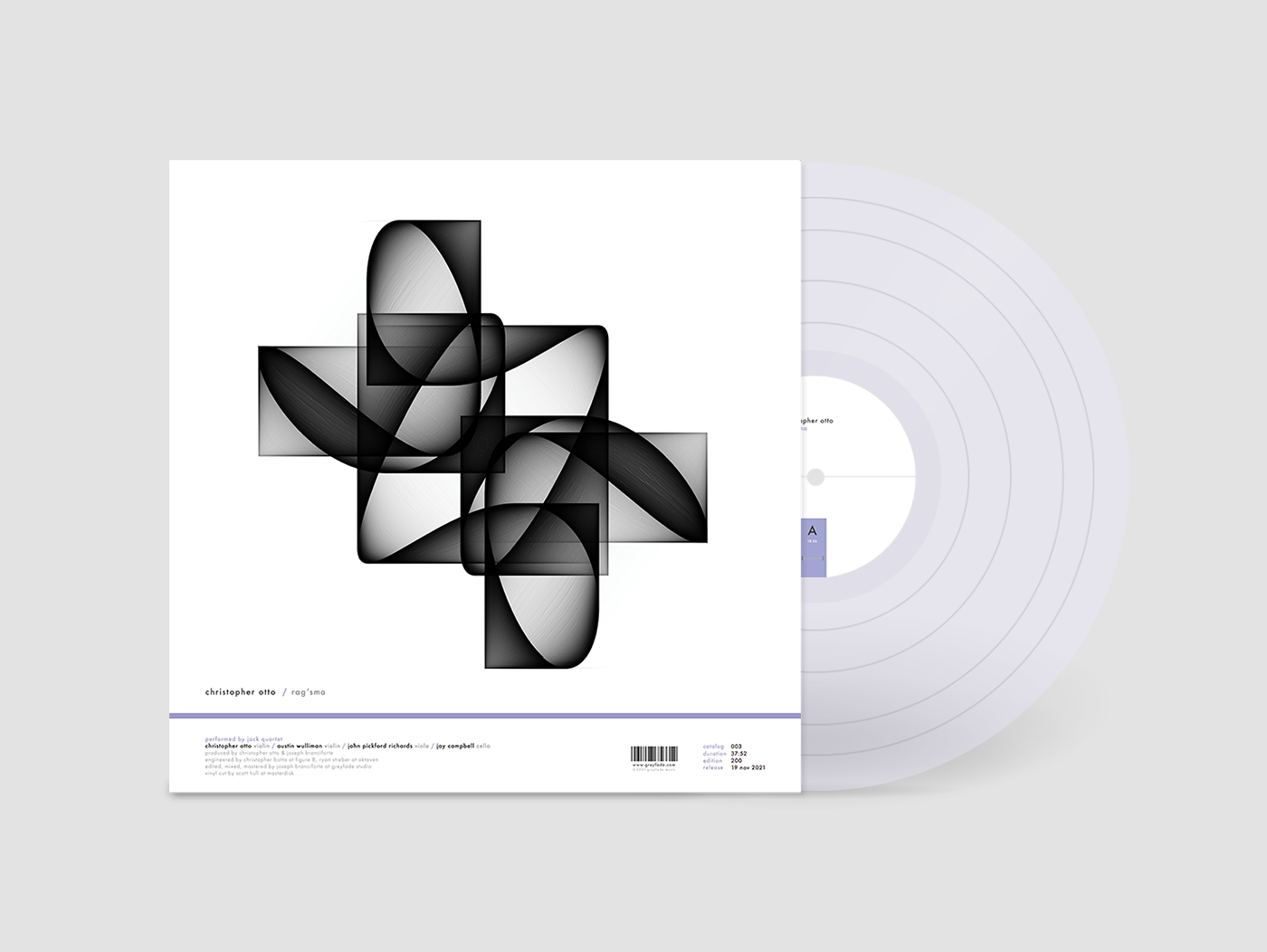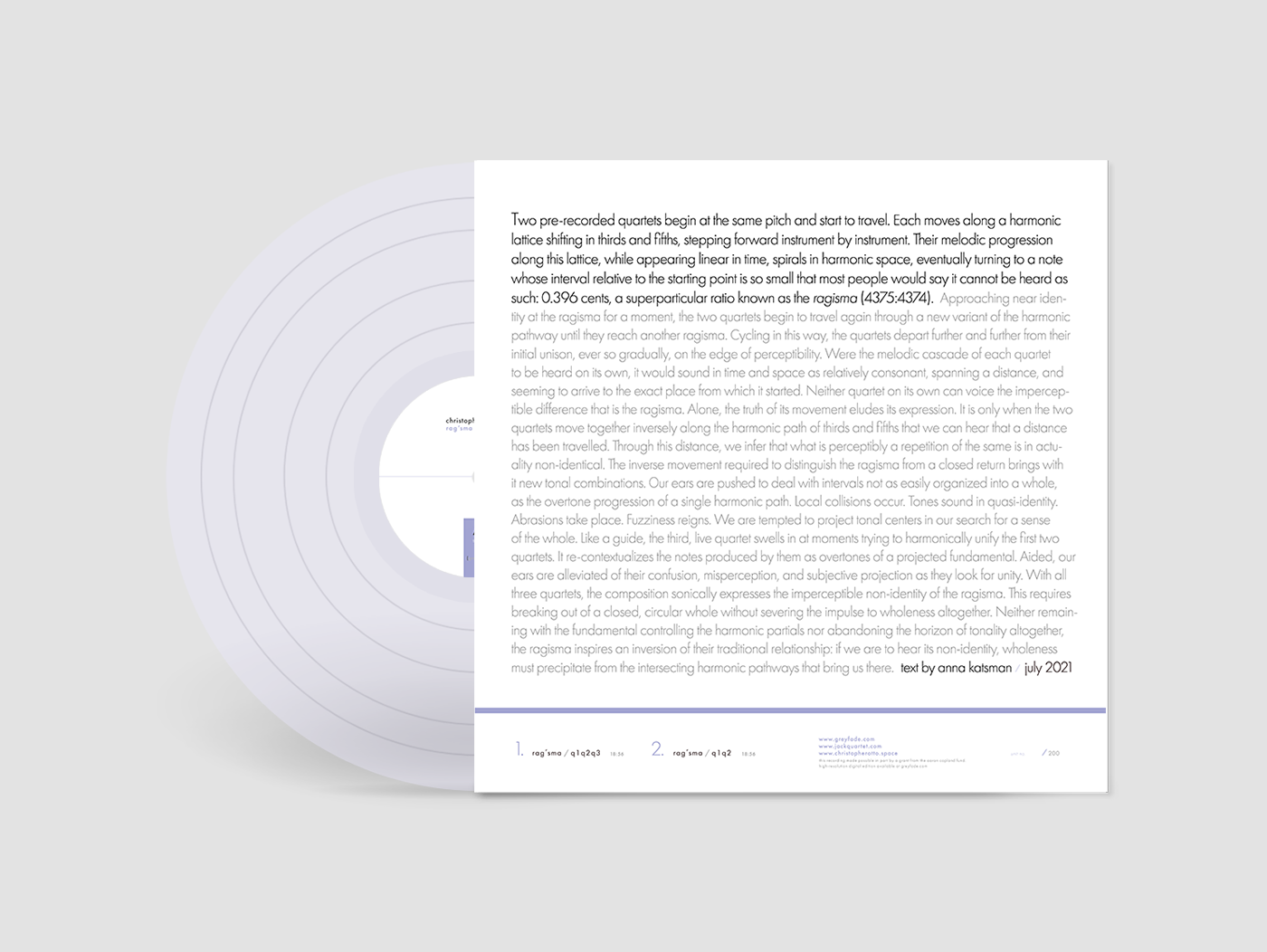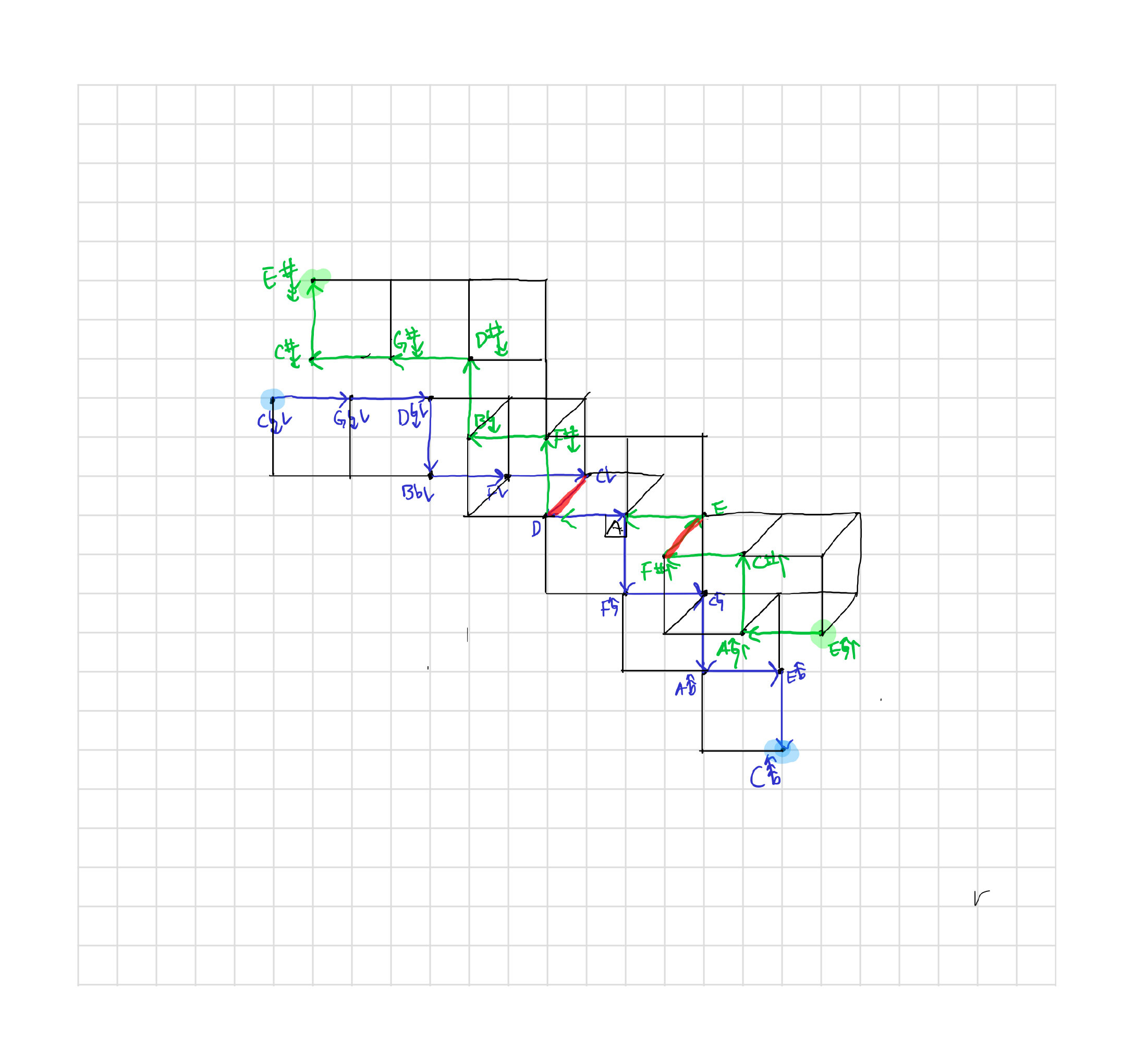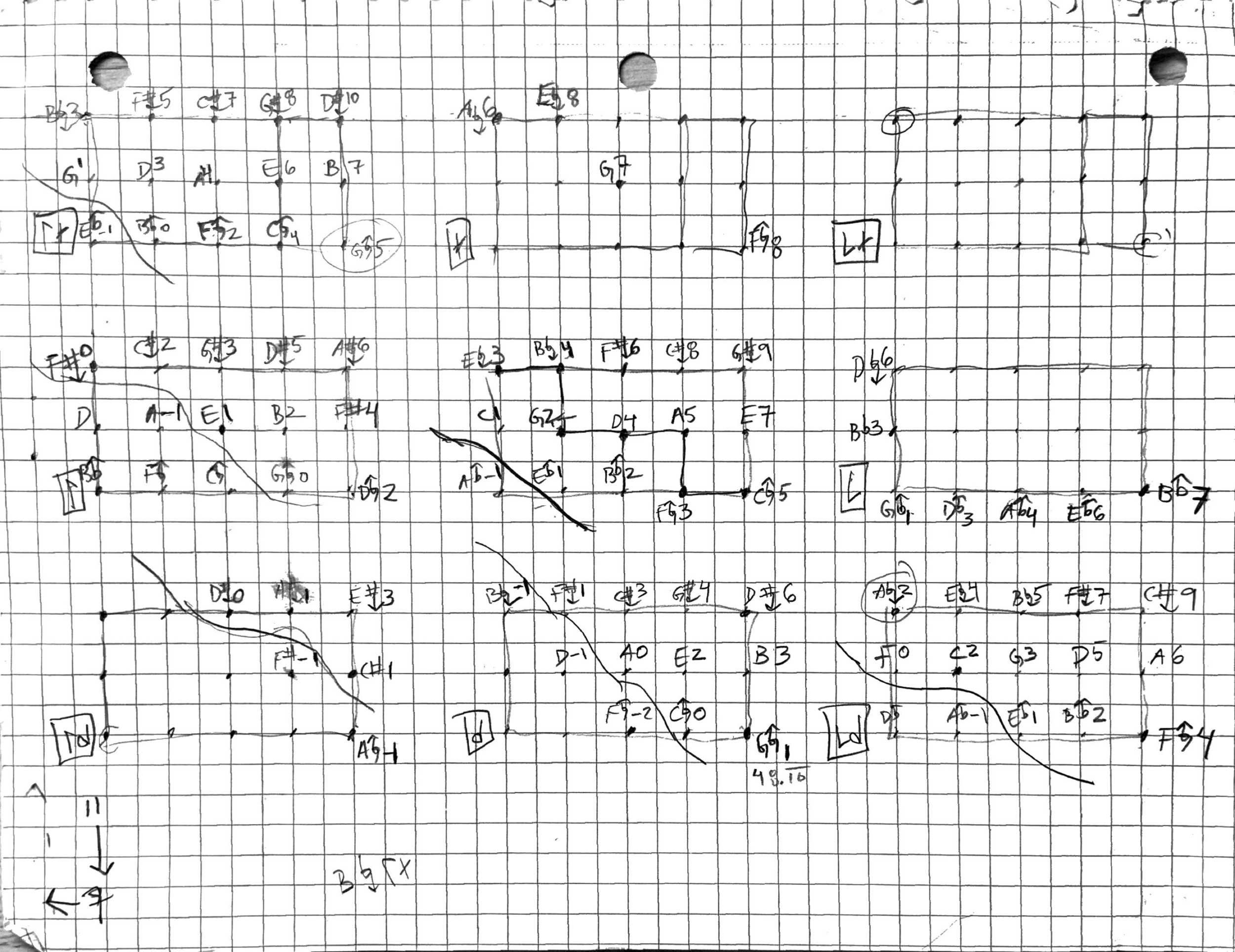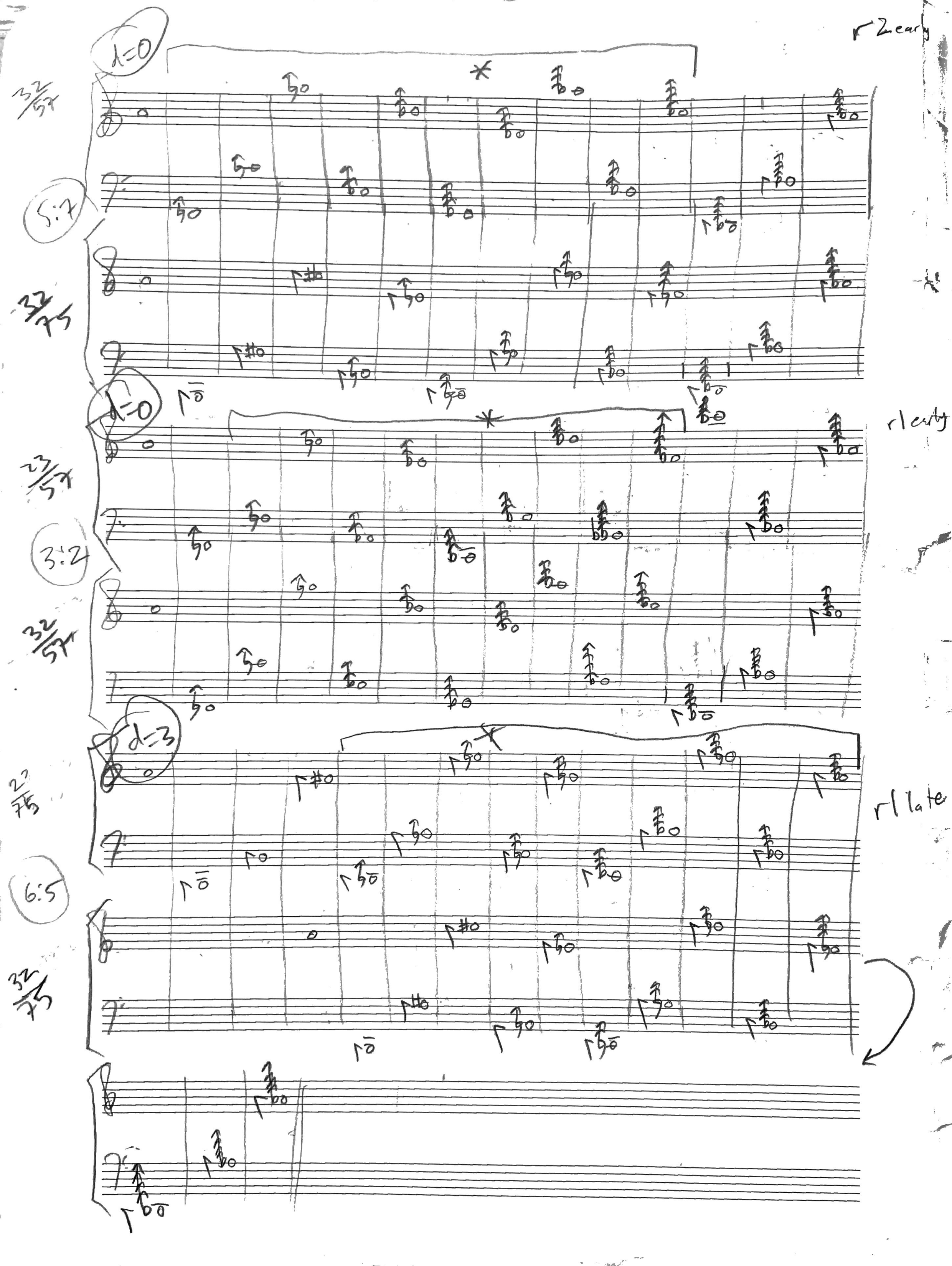christopher otto
rag’sma
catalog: 003
release: 19 nov 2021
duration: 38:46
formats: vinyl + digital
vinyl edition: 200
performed by jack quartet
christopher otto, violin
austin wulliman, violin
john pickford richards, viola
jay campbell, cello
The full-length compositional debut of Christopher Otto, violinist and founding member of the internationally acclaimed JACK Quartet. With its exacting mathematical construction, a harmonic language bridging just intonation and triadic tonality, and a dazzling, immersive sound, rag'sma announces the arrival of an important new compositional voice. Recorded by JACK Quartet x 3.
“I don’t think one needs to understand the mathematics at all to enjoy this music,” says violinist and composer Christopher Otto. Given the breathtaking mathematical precision involved in Otto’s work, it’s a fairly remarkable statement. “It’s more important that someone finds their own way into it. If they are really curious about how it’s put together mechanically, that’s great. But I wouldn’t want anyone to think that they have to slog through some technical jargon in order to appreciate the piece.”
Listening to rag′sma, a dazzling, immersive new triple string quartet and Otto’s full-length debut as composer, it becomes clear that his compositional thinking is informed by mathematics and mysticism in equal measure. His work forges deep connections between the rational world of numbers, the physicality of instrumental performance, and the subjective sense experience of the listener in ways that allow it to operate at multiple levels simultaneously: part science experiment, part virtuosic performance, part otherworldly sound sculpture.
As a founding member of JACK Quartet, one of the world’s premier contemporary string quartets, Otto is best known as a gifted interpreter of other composers’ music, working closely with leading figures such as Helmut Lachenmann, Georg Friedrich Haas, John Luther Adams, Philip Glass, and John Zorn. “Chris Otto is one of those ultra-rare musicians who combine complete technical mastery with the profound depth of feeling of an old soul,” says Zorn. “He is 100% music and brings a passion to everything he plays, elevating it to a level that is often beyond the composer’s wildest dreams. Chris is a living treasure — and his work is a miracle.”
But before the formation of JACK and a career performing some of modern music’s most revered composers, Otto pursued a dual undergraduate degree in math and music composition from the University of Rochester and Eastman School of Music. “When I started college, I wasn't sure if I wanted to do music or math as a career,” says Otto. ”I was interested in learning math for its own sake, but also for its potential connections to music. I especially enjoyed abstract algebra, and learned of some interesting work connecting it to music and sound.”
More recently, Otto has been attracted to just intonation as a framework for connecting mathematics and sound. Just intonation (JI) is the practice of tuning musical intervals to whole number ratios. In contrast to twelve-tone equal temperament (12TET) — the default tuning system in the West since the 19th century — JI treats these pure, rational intervals as its musical building blocks, rather than the twelve notes of the traditional Western chromatic scale.
“I first encountered JI when I was 15 or 16, through the work of Ben Johnston. Johnston had taught at the University of Illinois in Urbana-Champaign, where I grew up, and a former student of his introduced me to the central concept of just intonation, the idea that pitch can be organized rationally, that is, in terms of ratios of frequencies.” Otto explains. “So in just intonation, an octave is a 2:1 ratio, rather than twelve half-steps as in standard twelve-tone equal temperament. Unlike irrational, equal-tempered intervals, these rational intervals, like 2:1 (octave) and 3:2 (pure fifth), create cycles that align periodically, which gives the intervals a feeling of stability and distinctiveness. The infinite number of intervals range from the simplest to the most complex.”
For rag′sma, Otto drew inspiration from a particularly complex interval known as the ragisma — a ratio of 4375:4374. The size of this interval, 0.396 cents, is so small that most would say it cannot be perceived as such by the human ear. But for Otto, a musical universe that accommodates such fine gradations of pitch is one with much larger structural implications. “Equal temperaments are often used to approximate rational intervals in order to reduce the intervals to a finite number. Working in just intonation gives me a much broader palette of colors to work with and enables a finer-grained control of harmonicity.”
rag′sma’s design specifies three string quartets: Q1 and Q2, which are pre-recorded, and Q3, an optional part to be performed live.
Q1 and Q2 both begin at the same starting pitch of A=442 Hz and build outward using simple just intervals such as thirds (5:4) and fifths (3:2). Although each quartet steps forward using only the most basic and consonant of means, microtonal pitch discrepancies eventually begin to accrue. After a minute or so, Q1 has ascended by precisely one ragisma (0.396 cents); slightly later, Q2 completes its descent of one ragisma. The quartets continue spiraling in this way, each time forging a different melodic path of thirds and fifths, invariably arriving one ragisma higher (Q1) or lower (Q2). As these infinitesimal discrepancies become more and more perceptible, the listener is led into increasingly exotic harmonic terrain.
If Q1 and Q2 might be compared to two individuals on divergent trajectories, Q3 could be described as a constantly expanding and contracting bridge between them. “Like a guide, Q3 swells in at moments trying to harmonically unify the first two quartets,” explains Anna Katsman in the LP’s liner text. “It re-contextualizes the notes produced by them as overtones of a projected fundamental. Aided, our ears are alleviated of their confusion, misperception, and subjective projection as they look for unity.”
It was Otto’s intention that the piece function equally well with and without the third quartet layer. It is presented on this recording in Q1/Q2/Q3 and Q1/Q2 versions, as well as a version that dovetails between Q1 and Q2, revealing their individual melodic trajectories. Each version was given its own version-specific spatialization and mix by greyfade’s Joseph Branciforte.
The other three members of JACK Quartet — violinist Austin Wulliman, violist John Pickford Richards, and cellist Jay Campbell — share Otto’s fascination with just intonation. Their willingness to embrace its notational challenges, as well as its particular physical and mental demands, have made them a first-call ensemble for composers such as Catherine Lamb, Marc Sabat, and Georg Friedrich Haas, all of whom have written just intonation works for JACK. Otto has increasingly involved JACK as a part of his compositional process, treating the quartet as a laboratory for ever more ambitious experiments. Perhaps most of all, it is this symbiotic relationship that allows JACK to take Otto’s work so convincingly from the realm of speculative theory to one of vital music making.
It is also fitting that for Otto the connections between mathematics and art, the rational and the mystical, are best resolved in his dual role as composer and performer, using the language of just intonation.“For me, just intonation’s significance lies in the way it connects the abstract with the sensual, the universal with the particular, the eternal with the transient,” says Otto. The same could certainly be said of rag′sma, which elegantly forges these connections while expanding the known universe of string quartet performance.
produced by christopher otto & joseph branciforte
Q1/Q2 engineered by christopher botta at figure eight
Q3 engineered by ryan streber at oktaven audio
edited, mixed, and mastered by joseph branciforte at greyfade studio
vinyl cut by scott hull at masterdisk
liner text by anna katsman
STEREOPHILE (US): 5/5 stars. One would be hard pressed to find a string quartet that makes challenging music feel more inviting. Busy with spiraling ripples so warmly recorded that one never loses sight of it as string music. (read more)
THE NEW YORKER (US): Two pre-recorded quartets spiral apart slowly, their mounting distance producing a web of phantom tones, pulsations, and frictions. Joseph Branciforte’s judiciously managed recording illuminates this uncanny music. (read more)
BORING LIKE A DRILL (UK): A constant, radiant source of exotic colourations in harmony and timbre… minor key shadings on warped major triads, pitches that seem to arise from nowhere. (read more)
POPMATTERS (US): The mathematical precision that Otto applies to his music requires patience and a suitable frame of mind, but the rewards are limitless. A profoundly satisfying aural experience. (read more)
BANDCAMP (US): Violinist & composer Christopher Otto turns in a sprawling work that emphasizes the hypnotic effect of drone in its slowly expanding tones.
DUSTED (US): A cosmically awesome experience. In a vastly sweeping gesture, 'rag'sma' embodies the best of academic and mystical revelation with first-class production underpinning it. (read more)
HEADPHONE COMMUTE (UK): Fans of microtonal, dissonant, and unstable tunings will find a brand new universe to drown in. Sitting alongside harmonically rich experimental ambient and drone, this music is a missed and welcome guest. (read more)
FLATLAND FREQUENCIES (US): Unfurling drones methodically work their way outwards, causing shifts & minute imbalances between the impeccably recorded instrumentation. The package follows in the gorgeously high production standard as set in previous greyfade releases. (read more)
TOUCHING EXTREMES (IT): A magnificent work, to be played loud from a pair of quality speakers. All day long. (read more)
VITAL WEEKLY (NL): These closely knit microtonal pieces form a great web of sound, creating this hallucinatory effect on the listener. Slow and majestic, this is a soundtrack for a quiet Sunday afternoon. (read more)
POLYPHONIA (PL): Beautifully issued experimental composing debut of Christopher Otto, a conceptual hybrid of demanding mathematical and harmonic constructions, embedded in the deep, qualitative sound of the instruments. (read more)
INACTUELLES (FR): A record to drift in forever. Of austere and magnificent majesty. We have the impression of being at the heart of a perpetual timeless movement. (read more)
SOUNDSTAGE (CA): It may well be the ultimate intersection of art and math… [with] soundstages that showcase all the subtleties of stringed acoustic instruments. The result is a shimmering flow. (read more)
INNER (NO): Minimally tonal, abstract music that relies on subtle harmonic variation. The ear gradually begins to discern patterns and transformations, the unfolding of which is equally a function of the real, physical world [and] the listener’s musical imagination. (read more)
AN EARFUL (US): Order the album and trust me when I say it sounds like little else written for string quartet. (read more)
FREQ (UK): A slow and achingly gorgeous sound, with a sensuality and sombre affection for the tonalities that belies its mathematical and theoretical underpinnings. (read more)
NIGHT AFTER NIGHT (US): Don't sleep on the mesmerizing new JACK Quartet recording of music composed by founding member and violinist Christopher Otto—it's quite extraordinary. (read more)
PERCORSI MUSICALI (IT): A striking musical originality. Otto aims to find a subtle emotional capacity in motion beyond numbers, an invisible connection with the mystical and the divine. (read more)
LOOP (CL): Innovative music, impeccable in its execution, and above all immersive and penetrating. (read more)
AVANT MUSIC NEWS (US): Comes highly recommended to anyone interested in 8-voice or 12-voice stringed drones. Conducive to live performance… but could also work as a sound installation. (read more)
DATAWAVE (US): Beautiful and elegant music. The mathematical method in combination with art of classical music gives us another great album, highly recommended not only to specialists, but to everybody who is looking for something new and radical. (read more)
PAN M 360 (FR): Like the monochrome expanses of Mark Rothko, the musical landscapes created by Otto will reveal their richness to those who take the time to scrutinize them closely. (read more)
christopher otto
Christopher Otto is a composer and violinist living in the Bronx, New York. He studied composition at the Eastman School of Music and mathematics at the University of Rochester.
As a founding member of JACK Quartet, he has performed contemporary music throughout the world and premiered works from composers such as Chaya Czernowin, Catherine Lamb, Georg Friedrich Haas, Tyshawn Sorey, Philip Glass, and John Zorn. JACK's recordings include the complete quartets of Iannis Xenakis and Helmut Lachenmann and albums of the music of John Luther Adams, Clara Iannotta, Du Yun, Cenk Ergün, Dan Trueman, Zosha di Castri, Caleb Burhans, Marc Sabat, Amy Williams, Jason Eckardt, Horatiu Radulescu, and Elliott Sharp.
Since 2004 his compositions have focused on exploring new harmonic possibilities in an expanding universe of just intonation. JACK Quartet has been a laboratory for some of these experiments, performing several of his quartets with electronics. He has also written several pieces for the unique family of eight proportional violins designed by luthier and researcher Carleen Hutchins. While in residence at the University of Washington, he composed for an ensemble of instruments designed by Harry Partch.
jack quartet
Hailed by The New York Times as “our leading new-music foursome”, JACK Quartet is one of the most acclaimed, renowned, and respected groups performing today. JACK has maintained an unwavering commitment to their mission of performing and commissioning new works, giving voice to underheard composers, and cultivating an ever-greater sense of openness toward contemporary classical music. Over the past season, they have been selected as Musical America’s 2018 “Ensemble of the Year,” named to WQXR’s “19 for 19 Artists to Watch,” and awarded an Avery Fisher Career Grant.
JACK has performed to critical acclaim at Carnegie Hall (USA), Lincoln Center (USA), Berlin Philharmonie (Germany), Wigmore Hall (United Kingdom), Muziekgebouw aan 't IJ (Netherlands), The Louvre (France), Kölner Philharmonie (Germany), the Lucerne Festival (Switzerland), La Biennale di Venezia (Italy), Suntory Hall (Japan), Bali Arts Festival (Indonesia), Festival Internacional Cervatino (Mexico), and Teatro Colón (Argentina).
